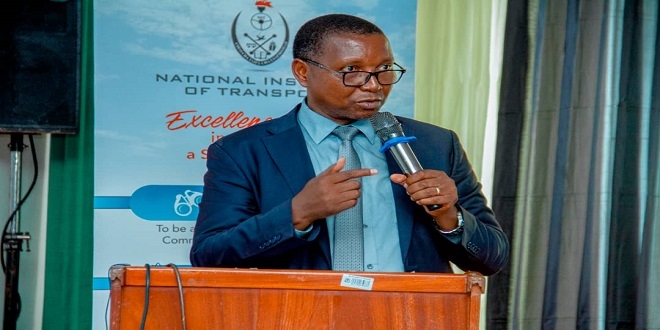In a bid to enhance educational opportunities for female students and increase access to specialized programs, the Minister of Education, Science, and Technology, Prof. Adolf Mkenda, recently launched the National Institute of Transport (NIT)’s Transport Excellence Scholarship (TES) Programme. The initiative is a promising step toward fostering equality and empowering female students in niche and priority areas.
Education is a cornerstone of development, and it’s crucial to ensure that all segments of the population, regardless of gender or location, have equal access to educational opportunities. The TES Programme, initiated by NIT, aims to bridge the gender gap and empower female students, especially those from rural areas.
Addressing the Need for Female Representation
Speaking at the launch event held at NIT’s main campus in Mabibo, Dar es Salaam, Prof. Mkenda commended NIT for introducing this scholarship program. He emphasized the potential impact it could have on female students and their access to quality education.
Read also: Huawei aims to boost Tanzania’s ICT infrastructure
EASTRIP Project Support
The Minister also lauded NIT for being a beneficiary of the Eastern Africa Skills for Transformation and Regional Integration Project (EASTRIP), which encompasses the TES programme. NIT received substantial financial support, totaling 21.25 million US dollars, from the EASTRIP project. This financial backing is more than what other beneficiaries from Tanzania, such as the Dar es Salaam Institute of Technology (DIT) and Arusha Technical College, received.
Meeting the Demand for Transport Professionals
Prof. Mkenda recognized the high demand for skilled professionals in the transport and logistics industry. The National Institute of Transport has played a significant role in producing human resources to meet these demands.
He assured the Institute of the government’s support in expanding technical education. This support includes introducing technical studies from form one to form four. Additionally, the government’s long-term vision is to offer three years of technical education in high school. This approach aims to equip more Tanzanians with international certifications and the capability to work abroad.
Under President Samia Suluhu Hassan’s leadership, the government has made strides in providing opportunities for diploma students to access loans. Many of the chosen courses are offered at the National Institute of Transport. These developments are part of a broader effort to enhance education and career prospects for Tanzanian youth.
Future Plans and Transformations
During his visit to NIT, Prof. Mkenda laid foundation stones for various construction projects supported by the World Bank’s EASTRIP project. These projects include the construction of male and female hostel buildings and other key facilities, all of which will bolster NIT’s capacity to prepare transport professionals and conduct research.
Prof. Zacharia Mganilwa, the Rector of NIT, shared the institution’s vision of becoming a Regional Center of Excellence in Logistics, Management, and Transport Technology. NIT’s mission is to provide high-quality education and training, research, and consultancy in these fields to contribute to sustainable socio-economic development.
Additionally, NIT has established two Centers of Excellence related to transport: the Centre of Excellence in Aviation and Transport Operations (CoEATO) and the Centre of Excellence in Road Safety (CoE-Road Safety).
NIT has ambitious plans for the future. The Institute is procuring a feasibility study for a new campus, covering 125 acres in Kikwetu, Lindi Region, dedicated to training the maritime skilled labor force.
Furthermore, NIT is on the path to transforming into the University of Transport. The United Republic of Tanzania has secured a financial grant from the People’s Republic of China to support this transformation.
Tanzania, Uganda sign landmark ICT agreement worth $28.8 million
EASTRIP Project and Achievements
Dr. Robert Msigwa, Deputy Center Leader at NIT’s Center of Excellence in Aviation and Transport Operations, briefed the Minister on the EASTRIP project’s achievements. Notably, NIT graduates have shown positive employment trends over the years. In 2021/2022, the employment rate for NIT graduates reached an impressive 74.1%, with a 40% employment rate for female graduates.
The project has also led to collaborations with various industries and institutions, aiming to enhance the practical aspects of education and produce well-prepared graduates for the job market. These collaborations include agreements with institutions in Kenya and Ethiopia, furthering regional integration.
The Eastern Africa Skills for Transformation and Regional Integration Project (EASTRIP) is a five-year initiative funded by the World Bank, focusing on increasing access and improving the quality of Technical and Vocational Education and Training (TVET) programs in Tanzania, Kenya, and Ethiopia. It also aims to strengthen regional integration through the establishment of Centers of Excellence in key sectors, including Transport, Energy, Manufacturing, and ICT. In Tanzania, NIT, along with other institutions, is a beneficiary of the EASTRIP project, which seeks to enhance education and skill development in the region.
This collaborative effort, with its strong focus on female students and future expansions, marks a significant stride towards a more inclusive, capable, and skilled Tanzanian workforce and higher education sector.




